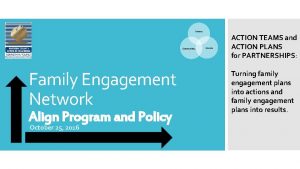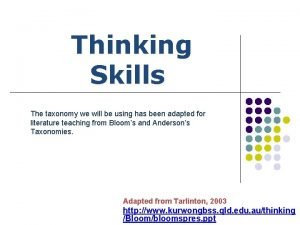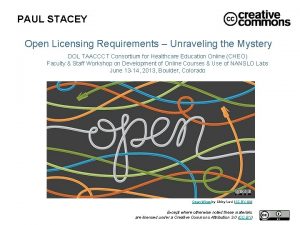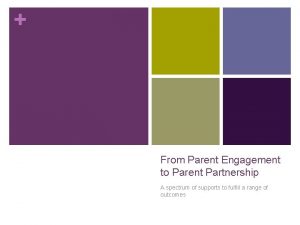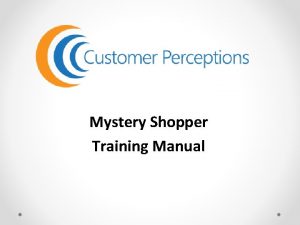Unraveling the Mystery of Parent Engagement and Uncovering


































- Slides: 34

Unraveling the Mystery of Parent Engagement and Uncovering Learning Styles Presented by: Mary Ceglio M. S. , CCC-SLP, LSLS Cert. AVEd. Cathy Chapman M. S. , CCC-SLP, LSLS Cert. AVEd.

Learner Objectives: ▪ identify learning styles in parents in order to effectively interact, instruct and coach parents on how best to work with their children at home ▪ identify what could be added to current early instruction practices to facilitate parent engagement using technology in the home and then school projects ▪ list strategies and tools to maximize parent engagement in home carryover and in school projects

What Mystery? Is Parent Engagement in Children’s Learning really a Mystery? (Do you have a difficult time with Parent Engagement? )

What Mystery? We Know: Research shows that the more parents are involved in their children’s education, the better and more advanced the learning. **https: //www. schoolfamily. com/school-family-articles/article/754 -5 -reasons-to-get-involved https: //www. education. gov. gy/web/index. php/parenting-tips/item/904 -five-reasons-forparents-to-get-involved-in-their-child-s-education https: //blog. himama. com/why-parent-involvement-is-important-in-preschool/

- The Key ▪ Ensure parents are active members of the education team. Do parents view themselves as a team member? ▪ Many parents feel ill-equipped and others don’t understand what to do or how to help their children.

Parent Comments as part of an Educational Team: ▪ “I am a hands-on learner and although I have seen therapists and teachers work with my child, I have never been offered the benefit of working and being shown how to work with my child. Usually, very politely, ‘do this…. ’ – and given papers. ” ▪ “I learn best by watching and repeating and watching some more. If I don’t know I ask. But I have never been asked to come watch – they ask at the ARD how I work with my child and then ask me to come for competitions and/or programs. Usually at parent-teacher conferences I ask how I can help my child and then we talk. ” ▪ Brandon’s mom: to this day…. .

Parent Letter: • Parent described Different Types of Parents with Different Styles of Parenting. • Parent indicated that to be a part of a team COMMUNICATION IS KEY • Parent feels JUDGEMENT (intended or not) from others keeps most parents from participating in anything. • HOW You (as the Professional) COMMUNICATE is KEY

Parent Letter: • Parent feels - No Matter how Busy the teacher is; Parent reminded that Parents are Busy too -Teacher should help with ANY Information UPFRONT – DON’T make the Parent go looking for it. • Parent noted that Parents often WANT to be INCLUDED but don’t know how. . . • TEACHERS KEEP ‘BUGGING’ THE PARENT AND BE OPEN TO WHAT THE PARENT HAS TO SAY AND/OR TO CONTRIBUTE






- The Questions ▪ How can we as Educators and Therapists facilitate Improved Collaboration? ▪ Do we understand the Parents’ Perspectives? ▪ Do we need to Coach and Train? ▪ What are OUR Options?

Help With the Mystery and Uncovering ▪ We, Teachers and Therapists, understand that to improve Children’s Learning, we must Understand their Learning Styles and Teach to their Preferred Mode. ▪ Adults have Learning Styles as well. If we better understood how our Parents Learn, would we better Coach, Collaborate and Include them?

**www. heartsforhearing. org Teresa H. Caraway, Ph. D. , CCC-SLP, LSLS Cert. AVT

What to Uncover for Learning Styles? We Know: Children learn in so many different ways We know about Visual Learners, Auditory Learners, Tactile and Kinesthetic learners Are there more?

What are Learning Styles and Who Has Them Everyone has a Learning Style – Begins at birth and changes as we grow until we find what works best for us! Learning Styles are – How we learn best; the best presentation to retain information **We pass that on to our children and they refine as they grow until they find what works best for them

Remember: Everyone Can Learn! ▪ As adults – there are four different styles: ▪ Dynamic ▪ Analytic ▪ Common Sense ▪ Imaginative

From Learning Styles to Terms and Strategies Used for Each Style Think about this – in a presentation – “I present the way I learn” (Do we do this? ) ▪ Visual - See, look, view, focus, appear ▪ Auditory - Hear, listen, sounds, resonate ▪ Kinesthetic - Feel, touch, grasp, concrete ▪ Auditory Digital - Sense, understand, think, learn, decide, consider, know, change **Linda Cattelan, Career & Life Coach, President of Results Catalyst Inc.

As We Begin to know Our Class this School Year and our Parents – How can we best help them? Can we use terms with Parents to help them ‘See, Hear, Understand’ the work that needs to be done with their child.

How Do YOU Learn? You just walked into your classroom after months off and learn there will be a new way to conduct class; via internet and classroom instruction. You see you have a new computer with drone. You are definitely ready to use the new computer but have never used a drone. How do you learn to use the drone?

Remember those Adult Learning Styles? You prefer to jump right in and work by trial and error? (I can do this and what if I do this? !) DYNAMIC You prefer not to jump in and read the manual – cover to cover (the person who made it said to do this…) ANALYTIC You prefer the basic facts (you know the quick paper that says in 10 simple steps) and then you go in experimenting – COMMON SENSE You prefer your own background knowledge and then consult with others and ask advice – IMAGINATIVE

Break What is your Learning Style? What does your Educational Team Look Like? Do you Gravitate toward those that Learn the way you Do?

- Where to Begin Teacher- Parent letters that go out at the beginning of every year along with a questionnaire – revamp them Include: § A ‘how do you’ learn activity § A ‘question about where they see themselves in the educational team’ § Ask about parents’ goals; what does the parent want for their child to accomplish

Sample Parent Letter


What to Look for in these school events to find out how to Coach your parents to Help their Child: Open House: • Have “Getting to Know You” activities - involve the child and the parent. • Have kid friendly stations for siblings in another part of the room. • ACTIVITY Bodily Demonstration given both through Visual and Auditory Means. Then watch for the amusing learning styles: through a demonstration that begins by holding out the right arm and making a 90 degree angle with it, touching the thumb and forefinger. Then put your fingers on your cheeks. The results are often amusing. (WATCH FOR LEARNING STYLES)

TEACHER Online Connections: • Create an on-line blog with ideas of various activities or homework studies • Newsletter and Class Dojo – • How are parents addressing activities? Phone-a-Family: This can be so daunting at times but parents really do love hearing positives! • How and What that child does at home and what Family does as a Family. • Make suggestions and note how the parent reacts. Be open to suggestions from parents! Family Fun Projects: • Plan Family Fun Projects once-a-month and then give to another family to add to it. • Families get to know one another; then see what each family comes up with creatively. • Keep it light and interactive. • Try one month School theme, one month Book theme • Be Inclusive and know learning styles as they come out.

Parent Perceptions and Information: • What is important to Parents – invite Parents to share what would be easier to make things happen for them. • Share research that indicates various Parent Learning Styles. They may surprise you and just tell you. • Parents may ask for examples and want to talk about it. Every situation is different and you need to let them know that options do matter.

What To Do If Not in School Even if in School – Plan some ONE on ONE Coach through ZOOM platform Use the parents learning style to coach THE PARENT through the lesson with their child Remember the retention chart for learning - Coaching? How?

Coaching? How? ▪ Parents will need to be COACHED to interact ▪ Parents will need to be COACHED to learn from you ▪ Parents previous comments justify and warrant CHANGE FROM TEACHERS AND THERAPISTS YOU TEACH 8 HOURS – FIVE DAYS A WEEK – TO A GROUP! 40 HOURS PARENT WITH THEIR CHILD(REN) AT LEAST 84 HOURS A WEEK PER 12 WAKING HOURS (IF NOT MORE)

Coaching With the PARENT 1)DYNAMIC Guided Experiments - Jump in and Lead with this Example “I wonder if you did this”. 2)ANALYTIC Demonstrate – Stay On and To the Point “Let me show you, we’ll talk all the way through it, and then you will try. ” 3)COMMON SENSE Show and Share – Show me how you work with them “This is what I recommend, ” Then come together – Test drive it 4) IMAGINATIVE Give explanation and then give Parent opportunity to check-in

REMEMBER ▪ Involve them at every turn and keep them in the Loop – they are part of the EDUCATIONAL TEAM ▪ Train them as soon as you learn their SKILLS SET ▪ UNDERSTAND WHY IT TAKES AN EDUCATIONAL TEAM : Specifically Teacher and PARENT
 Parent engagement network
Parent engagement network Uncovering motives hots
Uncovering motives hots Uncovering the past worksheet answer key
Uncovering the past worksheet answer key Uncovering history first
Uncovering history first Pathetic fallacy in jekyll and hyde
Pathetic fallacy in jekyll and hyde Hát kết hợp bộ gõ cơ thể
Hát kết hợp bộ gõ cơ thể Slidetodoc
Slidetodoc Bổ thể
Bổ thể Tỉ lệ cơ thể trẻ em
Tỉ lệ cơ thể trẻ em Gấu đi như thế nào
Gấu đi như thế nào Tư thế worm breton
Tư thế worm breton Hát lên người ơi alleluia
Hát lên người ơi alleluia Các môn thể thao bắt đầu bằng tiếng bóng
Các môn thể thao bắt đầu bằng tiếng bóng Thế nào là hệ số cao nhất
Thế nào là hệ số cao nhất Các châu lục và đại dương trên thế giới
Các châu lục và đại dương trên thế giới Cong thức tính động năng
Cong thức tính động năng Trời xanh đây là của chúng ta thể thơ
Trời xanh đây là của chúng ta thể thơ Cách giải mật thư tọa độ
Cách giải mật thư tọa độ Làm thế nào để 102-1=99
Làm thế nào để 102-1=99 Phản ứng thế ankan
Phản ứng thế ankan Các châu lục và đại dương trên thế giới
Các châu lục và đại dương trên thế giới Thơ thất ngôn tứ tuyệt đường luật
Thơ thất ngôn tứ tuyệt đường luật Quá trình desamine hóa có thể tạo ra
Quá trình desamine hóa có thể tạo ra Một số thể thơ truyền thống
Một số thể thơ truyền thống Cái miệng nó xinh thế
Cái miệng nó xinh thế Vẽ hình chiếu vuông góc của vật thể sau
Vẽ hình chiếu vuông góc của vật thể sau Nguyên nhân của sự mỏi cơ sinh 8
Nguyên nhân của sự mỏi cơ sinh 8 đặc điểm cơ thể của người tối cổ
đặc điểm cơ thể của người tối cổ Thế nào là giọng cùng tên? *
Thế nào là giọng cùng tên? * Vẽ hình chiếu đứng bằng cạnh của vật thể
Vẽ hình chiếu đứng bằng cạnh của vật thể Tia chieu sa te
Tia chieu sa te Thẻ vin
Thẻ vin đại từ thay thế
đại từ thay thế điện thế nghỉ
điện thế nghỉ Tư thế ngồi viết
Tư thế ngồi viết
